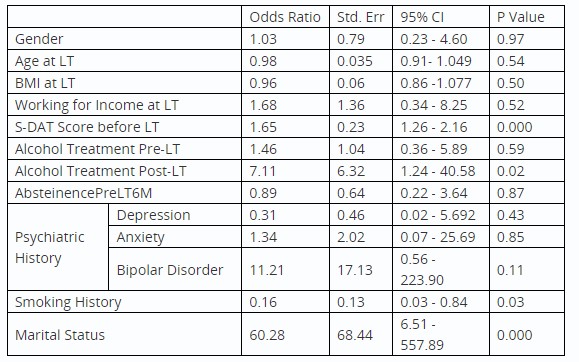Oral Paper Presentation
Annual Scientific Meeting
Session: Presidential Plenary Session 1
2 - Predicting Low-Risk for Alcohol Relapse Within One Year Post Liver Transplant for Alcoholic Liver Disease: S-DAT Score
Monday, October 23, 2023
8:10 AM - 8:20 AM PT
Location: Ballroom B

Jiten P. Kothadia, MD
University of Tennessee Health Science Center
Memphis, TN
Presenting Author(s)
Jiten P.. Kothadia, MD1, Anwesh Dash, MD2, Jarret Rong, MD2, Tzu-Yu Liu, MD1, Hemnishil Marella, DO1, Ryan Helmick, MD1, Corey Eymard, MD1, Jason M. Vanatta, MD1, Nair Satheesh, MD3
1University of Tennessee Health Science Center, Memphis, TN; 2University of Tennessee Health Science Center, College of Medicine, Memphis, TN; 3University of Tennessee Health Science Center/Methodist University Hospital, Memphis, TN
Introduction: Liver transplant (LT) for alcoholic liver disease (ALD) requires careful evaluation of the patients at risk for recidivism. We sought to evaluate the accuracy of the Social Determinant Acuity Tool (S-DAT) to identify patients with low risk for alcohol relapse within one year post-LT
Methods: One Hundred forty patients who underwent LT for ALD in our institution from January 2016 to November 2021 were included in the study. All patients underwent a thorough psychosocial evaluation to obtain detailed pre-transplant alcohol use history and psychosocial variables. Post-LT alcohol relapse was defined as any alcohol use regardless of the amount or frequency. It was determined based on patient interviews or blood/urine tests (alcohol level, ethyl glucuronide, and/or phosphatidylethanol test). The Social Determinant Acuity Tool (S-DAT) was used to stratify patients from excellent (Score: 0-6) to poor candidates (score: 35-40) for post-LT outcomes.
Results: The alcohol relapse rate at one-year post-LT was 26 (18.6%), and the overall relapse rate was 33 (23.6%). Multivariate logistic regression analysis revealed S-DAT score (Odds Ratio [OR], 1.65; P=0.000), alcohol treatment post-LT (OR, 7.11; P=0.02), smoking history (OR, 0.15; P= 0.03) and marital status (OR, 60.28, P=0.000) were independent risk factors associated with post-LT alcohol relapse within one year (Table 1). The areas under the receiver operative curves (AUROC) of the S-DAT score to predict alcohol relapse within one year Post LT was 0.77 (Figure 1). For specific cut-off value, the S-DAT score (≥12), for predicting relapse risk, has 96.2%% sensitivity, 40.4% specificity, 26.9% positive predictive value, and 97.9% negative predictive value.
Discussion: The S-DAT score's high sensitivity and negative predictive values make it a good screening tool for identifying patients at low risk of alcohol relapse post-LT.


Disclosures:
Jiten P.. Kothadia, MD1, Anwesh Dash, MD2, Jarret Rong, MD2, Tzu-Yu Liu, MD1, Hemnishil Marella, DO1, Ryan Helmick, MD1, Corey Eymard, MD1, Jason M. Vanatta, MD1, Nair Satheesh, MD3, 2, Predicting Low-Risk for Alcohol Relapse Within One Year Post Liver Transplant for Alcoholic Liver Disease: S-DAT Score, ACG 2023 Annual Scientific Meeting Abstracts. Vancouver, BC, Canada: American College of Gastroenterology.
1University of Tennessee Health Science Center, Memphis, TN; 2University of Tennessee Health Science Center, College of Medicine, Memphis, TN; 3University of Tennessee Health Science Center/Methodist University Hospital, Memphis, TN
Introduction: Liver transplant (LT) for alcoholic liver disease (ALD) requires careful evaluation of the patients at risk for recidivism. We sought to evaluate the accuracy of the Social Determinant Acuity Tool (S-DAT) to identify patients with low risk for alcohol relapse within one year post-LT
Methods: One Hundred forty patients who underwent LT for ALD in our institution from January 2016 to November 2021 were included in the study. All patients underwent a thorough psychosocial evaluation to obtain detailed pre-transplant alcohol use history and psychosocial variables. Post-LT alcohol relapse was defined as any alcohol use regardless of the amount or frequency. It was determined based on patient interviews or blood/urine tests (alcohol level, ethyl glucuronide, and/or phosphatidylethanol test). The Social Determinant Acuity Tool (S-DAT) was used to stratify patients from excellent (Score: 0-6) to poor candidates (score: 35-40) for post-LT outcomes.
Results: The alcohol relapse rate at one-year post-LT was 26 (18.6%), and the overall relapse rate was 33 (23.6%). Multivariate logistic regression analysis revealed S-DAT score (Odds Ratio [OR], 1.65; P=0.000), alcohol treatment post-LT (OR, 7.11; P=0.02), smoking history (OR, 0.15; P= 0.03) and marital status (OR, 60.28, P=0.000) were independent risk factors associated with post-LT alcohol relapse within one year (Table 1). The areas under the receiver operative curves (AUROC) of the S-DAT score to predict alcohol relapse within one year Post LT was 0.77 (Figure 1). For specific cut-off value, the S-DAT score (≥12), for predicting relapse risk, has 96.2%% sensitivity, 40.4% specificity, 26.9% positive predictive value, and 97.9% negative predictive value.
Discussion: The S-DAT score's high sensitivity and negative predictive values make it a good screening tool for identifying patients at low risk of alcohol relapse post-LT.

Figure: Figure 1: Accuracy of S-DAT score in Predicting Alcohol Relapse within 1-Year Post LT

Table: Table 1: Multivariate Logistic Regression Analysis of Risk Factors for Alcohol Relapse within 1-Year Post LT
Disclosures:
Jiten Kothadia indicated no relevant financial relationships.
Anwesh Dash indicated no relevant financial relationships.
Jarret Rong indicated no relevant financial relationships.
Tzu-Yu Liu indicated no relevant financial relationships.
Hemnishil Marella indicated no relevant financial relationships.
Ryan Helmick indicated no relevant financial relationships.
Corey Eymard indicated no relevant financial relationships.
Jason Vanatta indicated no relevant financial relationships.
Nair Satheesh indicated no relevant financial relationships.
Jiten P.. Kothadia, MD1, Anwesh Dash, MD2, Jarret Rong, MD2, Tzu-Yu Liu, MD1, Hemnishil Marella, DO1, Ryan Helmick, MD1, Corey Eymard, MD1, Jason M. Vanatta, MD1, Nair Satheesh, MD3, 2, Predicting Low-Risk for Alcohol Relapse Within One Year Post Liver Transplant for Alcoholic Liver Disease: S-DAT Score, ACG 2023 Annual Scientific Meeting Abstracts. Vancouver, BC, Canada: American College of Gastroenterology.


